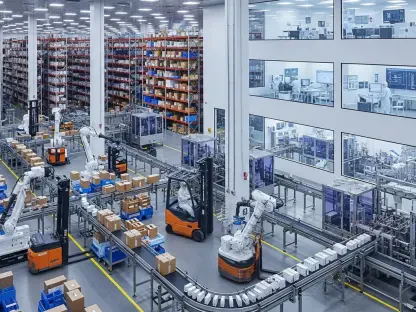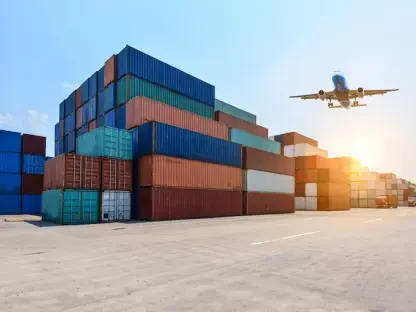Setting the Stage for a Sustainable Revolution in Food Logistics
Imagine a world where every piece of packaging in the food supply chain not only delivers goods safely but also slashes waste and carbon emissions by design. This isn’t a distant dream but a reality being shaped by innovative players like Tosca, a global leader in reusable and recyclable plastic packaging solutions. With mounting pressures from regulatory bodies, consumer expectations for sustainability, and the urgent need for operational efficiency, the food logistics market stands at a critical juncture. This analysis delves into how Tosca is redefining industry standards through circular economy models, smart technology, and a relentless focus on food safety. The purpose here is to uncover current market trends, evaluate Tosca’s strategic positioning, and forecast the trajectory of food supply chain innovations. By examining these dynamics, stakeholders can better navigate an increasingly complex landscape and seize opportunities for growth and responsibility.
Unpacking Market Trends and Tosca’s Strategic Role
Sustainability as a Market Driver in Food Packaging
The food supply chain market is witnessing a seismic shift toward sustainability, propelled by stricter regulations and heightened environmental awareness among consumers. Reusable packaging has emerged as a cornerstone of this transformation, with companies adopting closed-loop systems to minimize landfill contributions and resource depletion. Tosca stands at the forefront of this trend, offering durable plastic pallets and crates that are reused across multiple cycles before being recycled back into circulation. This approach significantly reduces packaging waste and aligns with global environmental, social, and governance (ESG) priorities, especially as new regulations loom on the horizon in key regions like Europe. Market data suggests that sustainable packaging solutions could capture a growing share of the logistics sector, driven by both compliance needs and cost-saving potential over time.
Beyond immediate environmental benefits, this trend reflects a broader market pivot toward circularity as a competitive advantage. Tosca’s model not only cuts carbon footprints but also offers long-term savings by reducing the need for constant repurchasing of single-use materials. However, challenges persist, including inconsistent recycling infrastructures across regions and the initial investment required for transitioning to reusable systems. Despite these hurdles, the market is leaning heavily toward solutions that balance ecological impact with economic viability, positioning Tosca as a pivotal player in shaping industry benchmarks for sustainability.
Efficiency Gains Through Technology and Logistics Optimization
Operational efficiency remains a critical focus in the food logistics market, where rising transportation costs and supply chain disruptions demand smarter solutions. Tosca addresses this through standardized, foldable packaging that maximizes truck space, thereby lowering shipping expenses and reducing empty return trips—a persistent inefficiency in traditional models. Real-time asset tracking, enabled by RFID and IoT technologies, further enhances inventory management, particularly in tech-savvy markets like Central Europe. Market analysis indicates that such digital integrations are becoming indispensable, with adoption rates expected to climb steadily through 2027 as companies seek greater visibility and predictability in their operations.
The economic implications of these advancements are substantial, as optimized logistics translate to reduced working capital needs and improved scalability. Tosca’s pooling system, which redistributes assets locally to minimize idle transport, exemplifies how strategic design can address longstanding market pain points. Yet, barriers such as technology adoption costs and regional disparities in digital readiness could slow progress in some areas. Nevertheless, the trend toward smarter, data-driven logistics is undeniable, with Tosca’s innovations offering a blueprint for how the market can evolve to meet escalating demands without sacrificing profitability.
Food Safety and Traceability as Consumer-Centric Priorities
Consumer trust hinges on food safety, making it a non-negotiable priority in the supply chain market. Tosca’s reusable plastic solutions are engineered for hygiene and stability, preventing contamination and damage to perishable goods like dairy and produce. These designs outperform many traditional alternatives by being easier to clean and more durable, directly addressing market concerns over spoilage and waste. Additionally, technology-enabled traceability meets growing consumer demand for transparency, allowing stakeholders to track products from origin to shelf—a feature increasingly valued in regions with stringent safety standards.
Market projections suggest that investments in safety-focused packaging will surge as regulatory oversight tightens and public scrutiny intensifies. Tosca’s ability to adapt its offerings to varying regional requirements, such as stricter hygiene protocols in certain markets, underscores its market agility. While misconceptions linger about reusable packaging compromising safety, evidence points to rigorous cleaning processes and material quality often surpassing single-use options. This positions Tosca to capitalize on a market segment where integrity and trust are paramount, reinforcing its role as a leader in delivering secure food logistics solutions.
Innovation and Automation Shaping Future Market Dynamics
The food supply chain market is on the cusp of a technological renaissance, with automation and digital innovation driving operational paradigms. Tosca’s consistent plastic pallets, maintaining uniform shape and weight, are ideally suited for AI-driven warehouse systems, a trend gaining traction across major distribution hubs. Market insights reveal that automation-compatible packaging could become a standard requirement within the next few years, as companies strive to enhance precision and reduce labor costs. Tosca’s proactive investments in material science and tracking technologies further signal its readiness to meet these emerging needs.
Looking ahead, the integration of advanced tools like blockchain for traceability or AI for logistics optimization could redefine market expectations. Economic factors, such as fluctuating fuel costs, and regulatory shifts toward sustainability mandates are likely to accelerate the adoption of innovative packaging solutions. Tosca’s forward-thinking approach, focusing on continuous improvement and adaptability, places it in a strong position to influence these market currents. The potential for scalable, tech-enhanced systems to become the norm highlights a transformative phase for the industry, with Tosca poised to lead through strategic foresight and innovation.
Reflecting on Tosca’s Market Influence and Strategic Pathways
Looking back, Tosca’s imprint on the food supply chain market has emerged as a powerful force for change, blending sustainability, efficiency, and safety into a cohesive strategy that addresses core industry challenges. Its circular economy model tackles waste and emissions head-on, while smart logistics and technology integration streamline operations in a cost-conscious environment. The emphasis on food safety and traceability resonates deeply with consumer priorities, cementing trust across the supply chain. For stakeholders, the path forward involves embracing reusable packaging as a strategic asset—piloting pooling initiatives to test scalability and partnering with innovators like Tosca to customize solutions. Retailers can harness traceability to differentiate their brands, while producers stand to gain from reduced waste and enhanced compliance. As the market continues to evolve, the focus shifts toward deeper investments in automation and digital tools, ensuring that the journey from farm to fork remains not only viable but visionary in its approach to a sustainable future.









